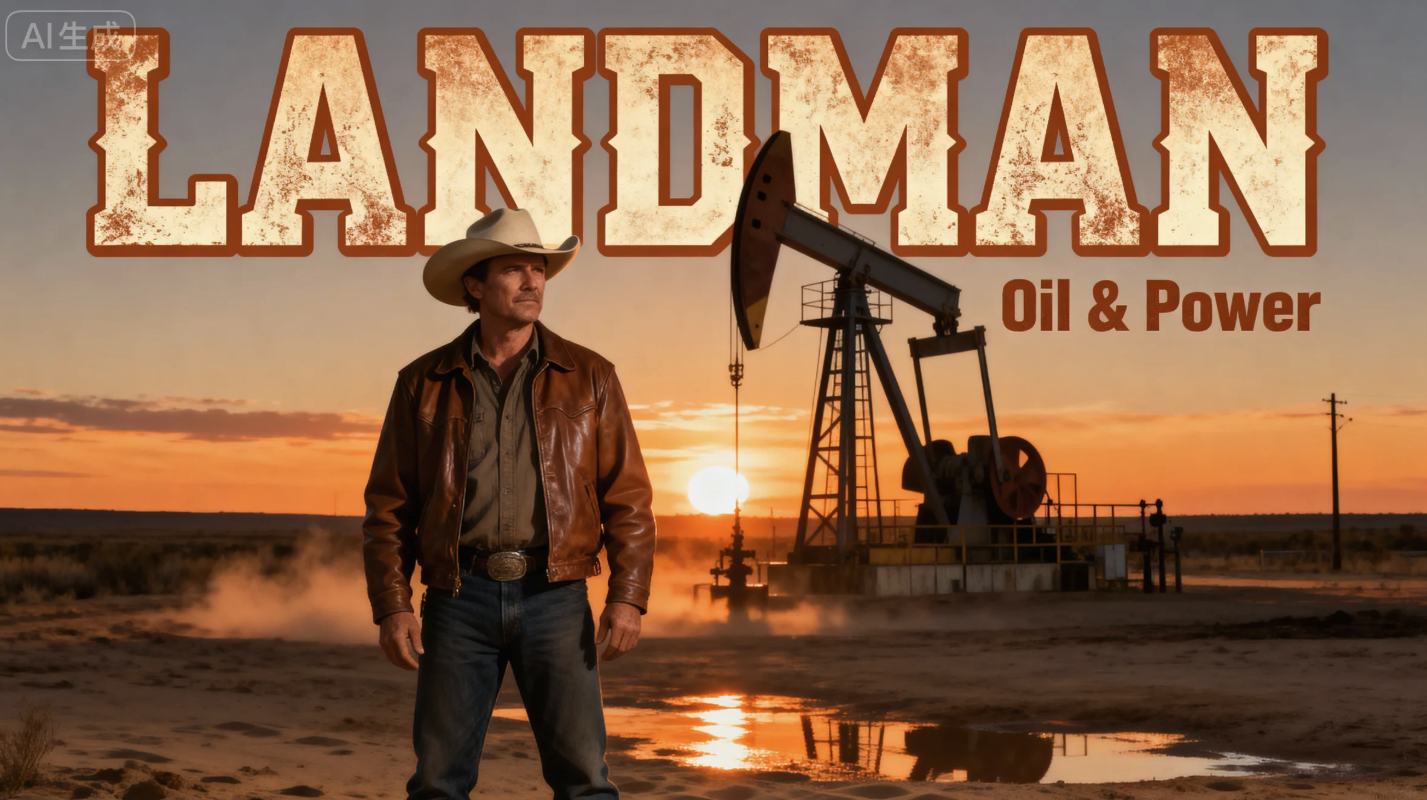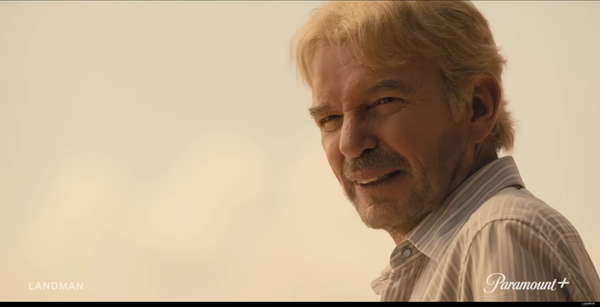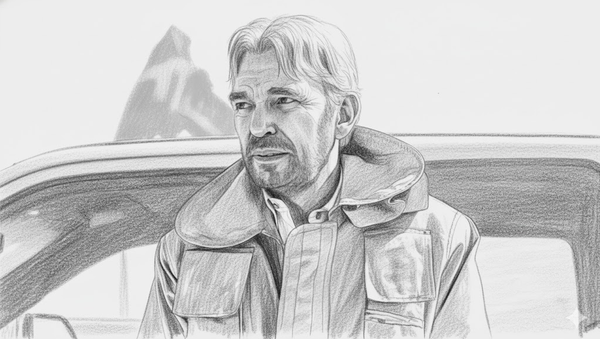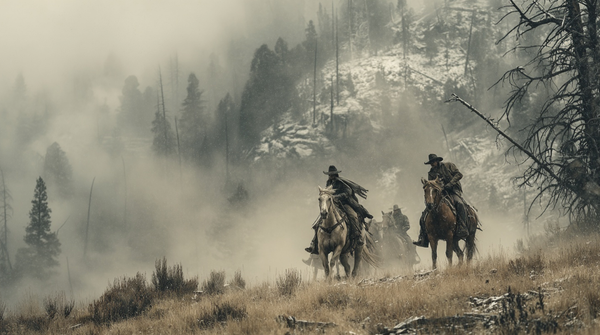Landman: A Stark Parable of Desire, Power, and the Price We Pay

Taylor Sheridan trades the Western’s comfort for a cold mirror on America’s profit engine.
Deep in the deserts of West Texas, drilling rigs roar day and night, pulling black gold from the earth.
Taylor Sheridan’s new series “Landman” takes this greed-scarred landscape as its stage to tell a contemporary parable about desire, power, and cost. It isn’t a Western in the traditional sense; it’s a stark mirror held up to the machinery of modern, profit‑driven life.
Above the Waste: A World Without Moral Gravity
The Texas oil patch in “Landman” is more than a geographic setting—it’s a symbolic moral wasteland. Here, traditional values have collapsed and naked jungle rules reign. With cool precision, Sheridan sketches a micro‑universe utterly ruled by capital: every inch of land, every relationship, every conversation is priced and traded.
What shocks most is how the series unveils the system’s inner workings without mercy: this isn’t a clash of good versus evil but a collusive structure sustained by everyone involved. No one stands outside it. Each person is both cog and culprit, victim and accomplice. The panoramic stalemate creates a suffocating pressure, suggesting the powerlessness of the individual before vast capital.
Cornered Lives: People Consumed by the Machine
Billy Bob Thornton’s Tommy Norris is the soul of the show—a seasoned fixer hired to put out fires for oil companies. But each success feels like another installment on the mortgage of his soul; every crisis solved pulls him farther from who he truly is. Thornton plays him with heartbreaking restraint: those tired eyes carry a lucid awareness of what he’s doing and a resigned acceptance that he can’t escape. He isn’t a hero, just an ordinary man sinking deeper into the mire—and this authenticity gives the role a depth beyond genre.
Jon Hamm’s oil baron Monty Miller represents another kind of tragedy. He has wealth, power, and influence, yet he’s lost the ability to perceive the world as it is. In his gaze, everything is quantifiable, tradable, controllable. Hamm captures the tension between Monty’s polished composure and inner emptiness—the king of a spiritual desert. His confidence isn’t strength; it’s a symptom of total disconnection.
Demi Moore’s Cami navigates a male‑dominated power game, searching for her own foothold. She’s sharp enough to see the rules, yet cannot step outside the game itself. Moore gives the character layered complexity: cold yet vulnerable, calculating yet sincere. Her relationship with Monty isn’t a simple marital dynamic; it’s two souls propping each other up while quietly consuming each other in the labyrinth of power.
Visual Metaphors: Austere Beauty, Unrelenting Despair
“Landman” speaks in images heavy with symbol. The cinematography leans on extremes—vast desert panoramas contrasted with claustrophobic interior close‑ups—visually underscoring how small and trapped the characters feel. Even the most lavish settings are rendered with chilly distance, as if material abundance were simply a refined prison.
Light itself carries subtext. Daylight tends to be harsh, almost overexposed; that naked brightness unsettles more than it soothes. Night sequences glow with pallid artificial light, stripped of warmth. This design sharpens the core mood: in this world, neither light nor darkness offers shelter.
Editing breathes in a distinctive rhythm. Long takes and pregnant silences let us feel the unspoken tensions between characters. When conflict detonates, the cutting turns sharp and violent, showing brutality without glamor. The goal isn’t sensory shock; it’s to expose the primal savagery that remains the system’s final logic beneath the veneer of civilization.
The Deeper Question: What Price Do We Pay?
The show’s central inquiry is brutal: when a society enshrines profit maximization as its sole principle, what do people lose? “Landman” offers a devastating answer—we lose what makes us human.
Its characters live a paradox. To survive, they must keep suppressing the softer parts of their nature; that suppression hollows them out. The most “successful” are often the most numb, running with machine‑like efficiency, having long forgotten what life is for. This spiritual barrenness is more frightening than poverty itself.
More unsettling still, the series refuses easy solutions or moral redemption. There’s no righteous judgment, no prodigal return, no last‑minute crisis of conscience. Attempts at resistance dissolve quietly back into the system; those who hold the line pay dearly. The uncompromising realism may depress some viewers, but it’s this honesty that gives “Landman” its power to shake us awake.
Final Appraisal: A Work You Can’t Look Away From
“Landman” isn’t the sort of show that leaves you cheerful. It’s a punch to the gut, pain that clarifies. Sheridan doesn’t court the audience; he chooses the harder path—staring straight at the era’s sharpest contradictions and deepest wounds.
It may lack the broad appeal of “Yellowstone,” with a darker tone and bleaker conclusions. Yet in artistic achievement and intellectual bite, it marks a new high for Sheridan. It breaks free of genre trappings to become a true tragedy—not because the ending is bleak, but because it reveals the almost inevitable corrosion of humanity under certain conditions.
When the rigs fall silent, when the last drop of oil is pulled, what remains? “Landman” answers coldly and clearly: a moral wasteland, and a host of wandering souls in the ruins. This isn’t a story about oil; it’s a prophecy about our time. It will make you uncomfortable. It will force you to think. That is precisely the stance great art should take.
Rating: 9/10
A stark, profound, uncompromising achievement. It rejects comfort, faces truth head‑on, and ultimately becomes a cruel mirror of contemporary American life. Not everyone will love it—but every serious viewer should see it.



